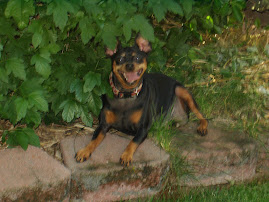
Keeshond
Alternative Names: smiling Dutchmen, keeshondonden (plural), wolf spitz, Chien Loup, Dutch barge dog
Country of Origin: Holland
History: The keeshond dates as far back as the sixteenth century in Holland and is believed to be a descendant of the German wolfspitz. It was used as a watchdog on boats and farms during the seventeenth and eighteenth centuries and came to represent the Dutch Patriotic Party during the political unrest following the French Revolution. It was first imported to the UK in 1905 and to the U.S. in 1928, where it is a popular companion.
Physical Description: The keeshond is a well-balanced, sturdy, medium-sized dog. It has a foxy, wedge-shaped head; small, erect ears; and dark brown eyes. The plumed tail curls over the back. Its heavy coat stands out and is a mixture of silver gray, cream, and black. The coat is very thick around the neck, shoulders, rump, hind legs, and chest, forming a lionlike mane. Thre are dinstinctive spectacle-like markings around the eyes with a line going to each ear.
Height: 17 to 18 inches
Weight: 30 to 45 pounds
Temperament: The keeshond is a fun-loving breed with a gentle nature. It is friendly toward almost everyone, including children and other animals. It is intelligent and eager to learn, making it highly trainable.
Activity Level: Moderate
Best Owner: This breed is adaptable and does well with a family in a city, suburban, or rural home.
Special Needs: Grooming
Possible Health Concerns: Cardiac disease, epilepsy, hip dysplasia, hypothyroidism




No comments:
Post a Comment